Contact: +91 99725 24322 |
Menu
Menu
Problem
The seed industry in Telangana faces various challenges, including counterfeit seeds, hoarding by private players, tampering with seed bags, and a lack of digitization. Farmers suffer from purchasing low-quality seeds, leading to reduced yields and financial losses. Moreover, delays in the certification process hinder the commercialization of developed seed varieties.
Solution
To address these challenges, PJTSAU and the Telangana government leveraged TraceX’s Blockchain-based traceability solutions. This technology enabled the monitoring of seed supply and quality, ensuring transparency and authenticity throughout the seed value chain.
Benefit
Blockchain-based solution ensures farmers access authentic, high-quality seeds, preventing counterfeit activities and safeguarding their investments. Digitizing seed records streamlines the supply chain, ensuring timely availability of quality seeds, enhancing crop productivity, and fostering financial stability for farmers.

TraceX successfully piloted the Seed Supply Chain traceability with Blockchain for the Telangana government in collaboration with PJTSAU. The enthusiasm, drive, and receptiveness of TraceX helped them to scale up their reach to statewide Seed traceability in Telangana, truly a proud and satisfying moment for us.
The agricultural sector is considered the backbone of India. A majority of our population is dependent on agriculture, directly or indirectly, for their livelihood, food, fodder, and fuel.
One of the significant hurdles that repeatedly plague this sector is the quality of seeds reaching farmers. A seed is a primary input for agriculture and bears the responsibility for crop production, quality, and contribution of all other inputs. It is the fundamental block of agriculture.
The seed cycle begins with the Nucleus Seed, which is genetically pure and used for monitoring performance. Breeder Seeds are then produced under strict supervision to maintain genetic purity. These seeds give rise to Foundation Seeds, which are further distributed by seed corporations to meet local demands. Finally, Certified Seeds, approved by certification agencies, are provided to farmers for cultivation. Throughout this cycle, ICAR oversees food safety and coordinates seed production to meet population needs.
According to ICAR, Indian domestic seed market accounts for 2 billion USD out of 45 billion USD international seed market. It is estimated that the direct contribution of quality seed alone has a positive impact on overall production by approximately 15-20%.
However, the circulation of poor quality and spurious seeds is rampant in India.
PJTSAU, along with agricultural scientists, collaborates closely with startups to develop a pilot program focused on digital technology applications in agriculture. Under the aegis of ‘Prof. Jaishankar Telangana State Agricultural university’ (PJTSAU) SRTC undertakes seed research from ‘Foundation Seeds’ to ‘Breeder Seeds’ for various crops like paddy, red gram and green gram.
PJTSAU developed Telangana Sona, a robust hybrid rice strain known for its superior quality, high yield, and shortened growth cycle of 120 days compared to the usual 150-160 days. Initially cultivated and sold to farmers by the university, its popularity surged among consumers, leading to a sharp increase in demand. However, the rapid demand growth prompted several private vendors to sell rice seeds under the Telangana Sona name without any verification or traceability, capitalizing on the variety’s reputation for quick profits.
Challenges they Encountered in the Seed Market
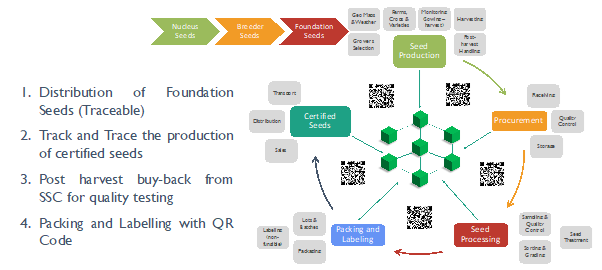
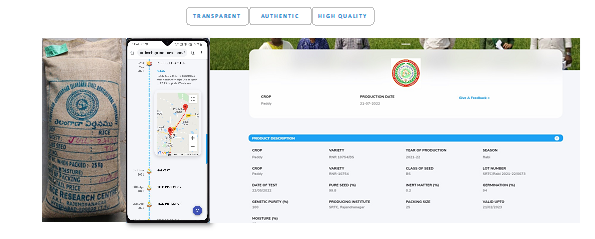
Farmer Registration and Identification: Digitally registering farmers and identifying them for specific seed cultivation.
Geo-mapping of farmlands: Mapping farmlands to monitor field conditions and locations.
Package of Practice with farmers: Providing guidelines for seed cultivation accessible through the TraceX application.
Crop-Mapping and Data Capture: Capturing crop data to analyze farmer progress and seed batch performance.
Seed processing and quality assurance: Treating, cleaning, and grading seeds to ensure high-quality standards.
Certification by external accreditation agencies: Partnering with accreditation agencies to certify seed quality based on set parameters.
QR code labeling and traceability: Assigning unique QR codes to each seed bag for accessing detailed information about the seed source and quality.
Ensuring traceability and authenticity: Providing complete traceability and authenticity of seeds to farmers, universities, and private players through QR code scanning.
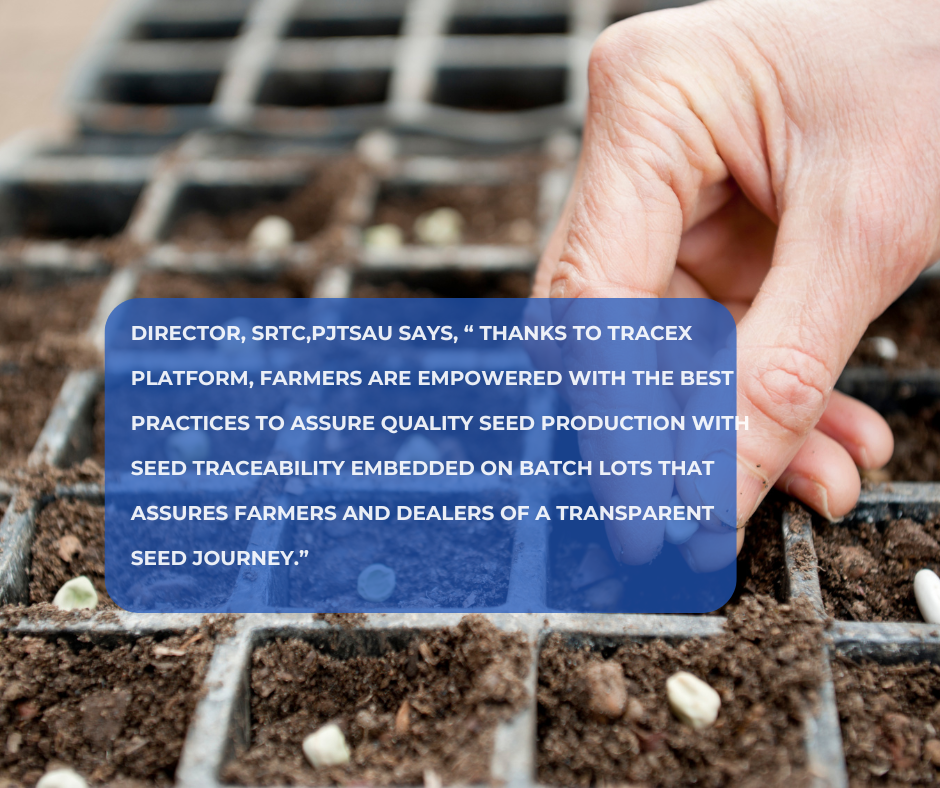
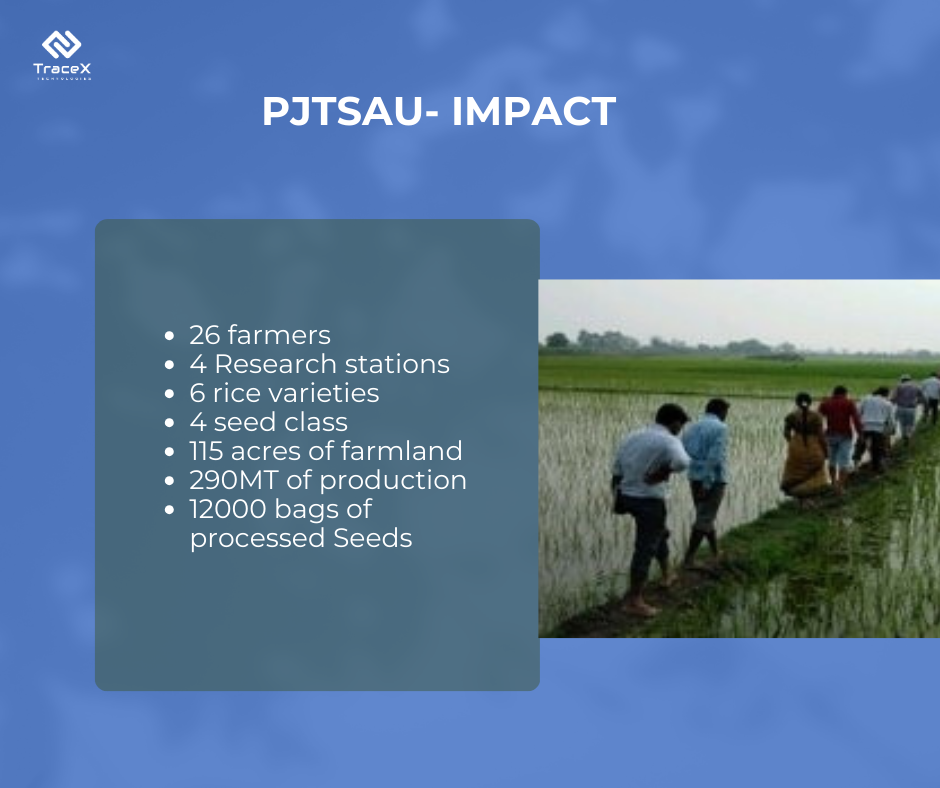
Transparency, Trust and Success for your Climate Journey.
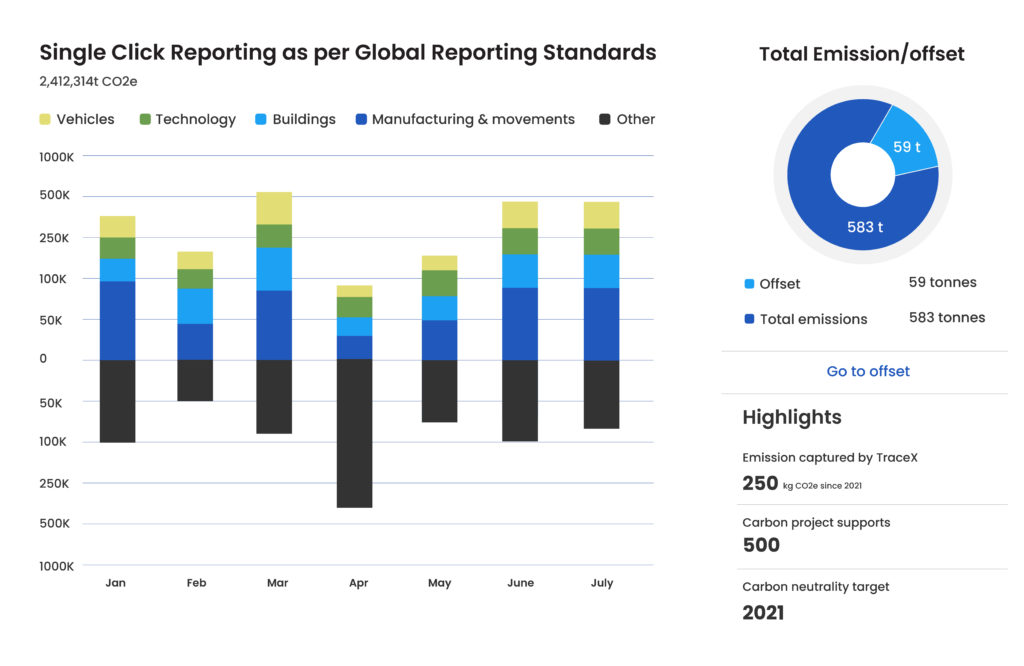
Copyright © 2024 Blockchain for Food Safety, Traceability and Supplychain Transparency
We use cookies on our website to give you the most relevant experience by remembering your preferences and repeat visits. By clicking “Accept All”, you consent to the use of ALL the cookies. However, you may visit "Cookie Settings" to provide a controlled consent.
| Cookie | Duration | Description |
|---|---|---|
| cookielawinfo-checkbox-analytics | 11 months | This cookie is set by GDPR Cookie Consent plugin. The cookie is used to store the user consent for the cookies in the category "Analytics". |
| cookielawinfo-checkbox-functional | 11 months | The cookie is set by GDPR cookie consent to record the user consent for the cookies in the category "Functional". |
| cookielawinfo-checkbox-necessary | 11 months | This cookie is set by GDPR Cookie Consent plugin. The cookies is used to store the user consent for the cookies in the category "Necessary". |
| cookielawinfo-checkbox-others | 11 months | This cookie is set by GDPR Cookie Consent plugin. The cookie is used to store the user consent for the cookies in the category "Other. |
| cookielawinfo-checkbox-performance | 11 months | This cookie is set by GDPR Cookie Consent plugin. The cookie is used to store the user consent for the cookies in the category "Performance". |
| viewed_cookie_policy | 11 months | The cookie is set by the GDPR Cookie Consent plugin and is used to store whether or not user has consented to the use of cookies. It does not store any personal data. |